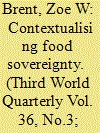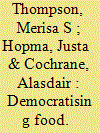|
|
|
Sort Order |
|
|
|
Items / Page
|
|
|
|
|
|
|
| Srl | Item |
| 1 |
ID:
138464


|
|
|
|
|
| Summary/Abstract |
As food sovereignty spreads to new realms that dramatically diverge
from the agrarian context in which it was originally conceived, this
raises new challenges, as well as opportunities, for already complex
transnational agrarian movements. In the face of such challenges calls
for convergence have increasingly been put forward as a strategy for
building political power. Looking at the US case, we argue that historically
rooted resistance efforts for agrarian justice, food justice and
immigrant labour justice across the food system are not only drawing
inspiration from food sovereignty, but helping to shape what food
sovereignty means in the USA. By digging into the histories of these
resistance efforts, we can better understand the divides that exist as
well as the potential for and politics of convergence. The US case
thus offers important insights, especially into the roles of race and
immigration in the politics of convergence that might strengthen the
global movement for food sovereignty as it expands to new contexts
and seeks to engage with new constituencies.
|
|
|
|
|
|
|
|
|
|
|
|
|
|
|
|
| 2 |
ID:
175533


|
|
|
|
|
| Summary/Abstract |
Prevailing political and ethical approaches that have been used to both critique and propose alternatives to the existing food system are lacking. Although food security, food sovereignty, food justice, and food democracy all offer something important to our reflection on the global food system, none is adequate as an alternative to the status quo. This article analyses each in order to identify the prerequisites for such an alternative approach to food governance. These include a focus on goods like nutrition and health, equitable distribution, supporting livelihoods, environmental sustainability, and social justice. However, other goods, like the interests of non-human animals, are not presently represented. Moreover, incorporating all of these goods is incredibly demanding, and some are in tension. This raises the question of how each can be appropriately accommodated and balanced. The article proposes that this ought to be done through deliberative democratic processes that incorporate the interests of all relevant parties at the local, national, regional, and global levels. In other words, the article calls for a deliberative approach to the democratisation of food. It also proposes that one promising potential for incorporating the interests of all affected parties and addressing power imbalances lies in organising the scope and remit of deliberation around food type.
|
|
|
|
|
|
|
|
|
|
|
|
|
|
|
|
|
|
|
|
|